The Definitive Guide To The Best Films Of 2014
All major film festivals have given their verdicts, the Golden Globes have just passed and the Oscars are already in sight. The world of film of 2014 is about to close, and it seems to me like the ideal moment to establish a well thought and objective list of the best of the year.
Yeah, I know. Yet another list. I hate them too. I personally find it incredibly tiresome to read all these countdowns that begin to populate the Internet every year since early November. For starters, it sometimes feels like each list is just a buildup from the one before it. In these times of disposable journalism, celerity is the most sought out quality. Whomever delivers the first punch wins the most clicks. Deep thought and thorough analysis are often seen as a handicap. Such is the state of the world we live in.
Another vice that one can find in these “best of” lists is the lack of objectivity that inspires them. If you pay close attention, you’ll see that most of these are not built upon the inherent qualities of the films mentioned, but are rather cooked up depending on the outlet’s respective audience. If you check out Sight & Sound or Little White Lies for example, you’ll find that “artsy” or English speaking independent films encompass the vast majority of the selection. Whereas, if you take a peek at IGN or Heat Vision, you’ll find that for them, superhero films and PG flicks are the only cinema that seems to exist.
So, with the intention of delivering the most objective list I can possibly muster, I actually took the time to watch more than 250 films from all over the world to deliver this review. From highly stylized experimental animation, to the goriest of blood fests, this here is my best attempt as a filmmaker, but above all as someone infatuated with the art of cinema, to sum up the finest works of 2014.
There are some films listed here that wrapped post production or got released in late 2013, and thus got too little exposure to be mentioned in any 2013 countdown. Similarly, there are some films like Her, Only Lovers Left Alive, The Wolf of Wall Street and Inside Llewyn Davis that got wide theatrical releases in 2014, yet I didn’t include here because they were produced in 2013 or received festival exposure that year.
Ghost stories, psychopathic adventures, romantic war films and heart wrenching dramas. And yes, you can find here a couple of superhero films as well. Movies from China, Russia, Argentina and Ireland. Here they are. The definitive list of the best of 2014. Enjoy!
30. 20,000 Days on Earth

Like him or not, Nick Cave is one of the greatest musicians of the 20th century and one of the last genius of Rock & Roll. Ian Forsyth delivers us the 20000th day in the life of the Australian performer during the recording of his 2013 album Push the Sky Away (f***ing great by the way).
This film, part documentary, part fiction has been labeled by many critics as unwatchable by anyone who isn’t a Bad Seeds fan, but I believe it’s actually the opposite. 20000 Days on Earth is so captivating it not only offers to hardcore fans an intimate look at the creative process of the band, but it also manages to deliver a universally appealing study of what it means to be an artist in this technological and noise ridden society of today.
29. The Babadook/The Canal

In my opinion, the genre of horror is going through a temporary phase of stagnation. Simple jump scares and gore have been used to such a degree they’re not scary anymore. That, summed to the fact that the increased access to technology has put ice on most of our fears for the supernatural, has made horror films of recent years look repetitive and dry to say the least. And I believe this was not a particularly good year for the genre either. But works like The Babadook and The Canal are the spearhead of a new brand of scares, one which deals with real fears, with those monsters that dwell inside the human psyche.
Both films are essentially about family conflict. About loss.
Australian film The Babadook tells the story of a couple that suffers a car accident while on their way to the hospital to give birth to their first child. The father dies in the horrible crash and Amelia (Essie Davis) is left to deal with a fractured family.
Society often portrays motherhood as a jolly fairytale ride that to me is almost dehumanizing. Having a child is anything but easy and women do not turn into ascetic machines when they give birth. Suffering and hardship also take part of what it means to be a mother. Little boy Samuel (Noah Wiseman) symbolizes both life and death, both a curse and a blessing that Amelia has to endure. Mother and son try to live their lives in denial of the terrible tragedy as a way to cope with their trauma. But everything that is left unsaid will grow to a point it will soon materialize as a dreadful presence impossible to ignore.
The Canal is an Irish film that follows David, an introspective family man immersed in his work as film archivist. After suspicions of infidelity, one night he follows his wife after work only to confirm she’s having an affair. Coincidentally, she disappears that same night. From that moment on, his mind enters in a spiral of madness as he tries to deal with his loss. As a product of his weak state of mind, or as pure chance, he begins to find unsettling parallels between his life and a rare police footage of a crime investigation of the 1900’s. The frontier between real life and imagination gets blurred without recognition as he begins to believe that spirits are responsible of his wife’s disappearance and the abnormal events that follow.
Not surprisingly, both films were financed by public institutions, with the The Babadook completing its budget throughout a crowdfunding campaign. The commercial and critical success of these films are telltales of an audience growing tired of established formulas and eager for new ideas. After all, to be scared is all about the element of surprise.
28. Relatos Salvajes (Wild Tales)
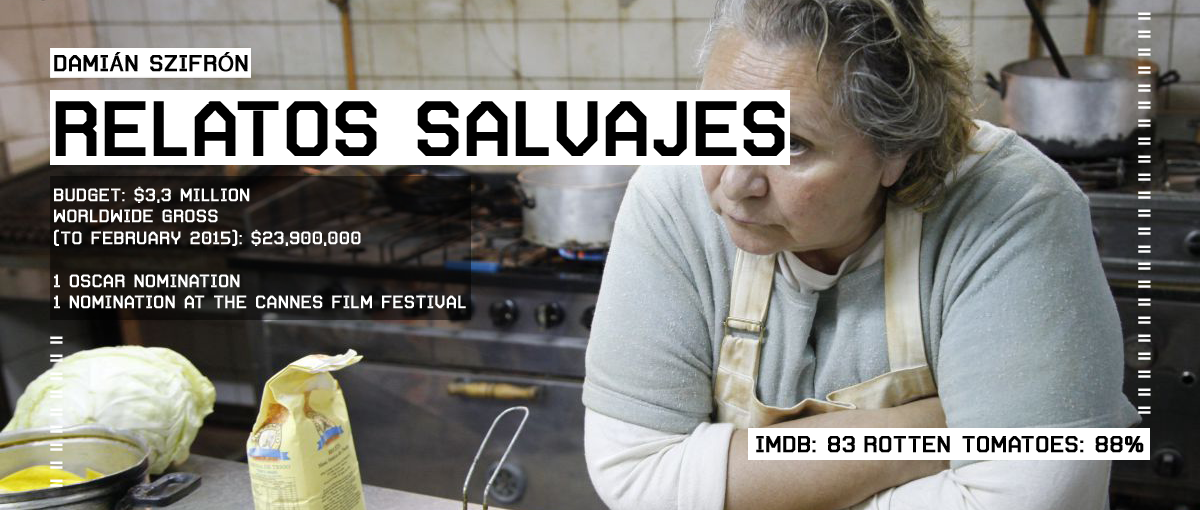
This Argentinian film is a compilation of six standalone shorts that deal with common people committing hideous crimes. A bullied student plotting an epic revenge, a woman taking justice by her own hand, a confrontation over social class that ends in tragedy, a tale of corruption gone horribly wrong and an infidelity revealed at the worst possible moment.
Every story is a drama on the surface, but writer/director Damian Szifron skillfully gives the events such a tone of absurdity it’s impossible not to laugh your guts out. In fact, the events are so violent and cruel you’ll feel wrong for laughing, but you’ll can’t avoid it all the same. The film has been a favorite among audiences throughout the festival circuit, to much envy of other deeper, more relevant films.
Yes, you can accuse Relatos Salvajes of treating in a lighthearted manner crucial issues of Latin American life as murder and corruption. And yes, you can accuse Szifron’s movie as exploitative. But that doesn’t take away the multiple merits of an expertly crafted and effective film as this. Relatos Salvajes is the most entertaining movie of the year. Period.
27. Love is Strange

This film follows the ups and downs of George and Ben, a same sex couple who has been living together in Manhattan for 39 years. Their relationship has been fairly unaffected by the prejudices of society, as they have built over the years a loyal group of friends that grants them with enough trust and understanding. Now that gay marriage is legal in New York city, they decide to tie the knot, but ironically, it’s precisely then when social pressure seems to get the best out of their relationship and everything they have built over the years starts to crumble before their eyes.
The film realistically portrays how society isn’t fully prepared yet to trash old preconceptions. However, Love is Strange is not a discourse about tolerance and gay culture. Discrimination sure is what detonates the conflict, but veteran director Ira Sachs digs much deeper. Love is Strange examines the true value of friendship when it’s taken to certain limits. It’s easy to be best friends until you’re kicked out of your house and you suddenly have to crash on their couch for months. Admiration, friendship and lust are different emotions that the film revisits constantly in an attempt to reflect over the concept of love in all of its expressions.
Although the tragedy at the end feels a bit unearned, the last 10 minutes are beautifully simple and to me the best part of the film. Alfred Molina and John Lithgow feel as if they’re really pouring their hearts out here, delivering subtle and masterful performances that go beyond the challenge of having to kiss another man. With an exquisite choice of classical themes as background and some of the most heartfelt lines delivered throughout the year, this tale of love between two men is the best romantic film of 2014. (Not to spoil the merits of the film here, but I do believe it was a poor year for romantic movies)
26. Locke
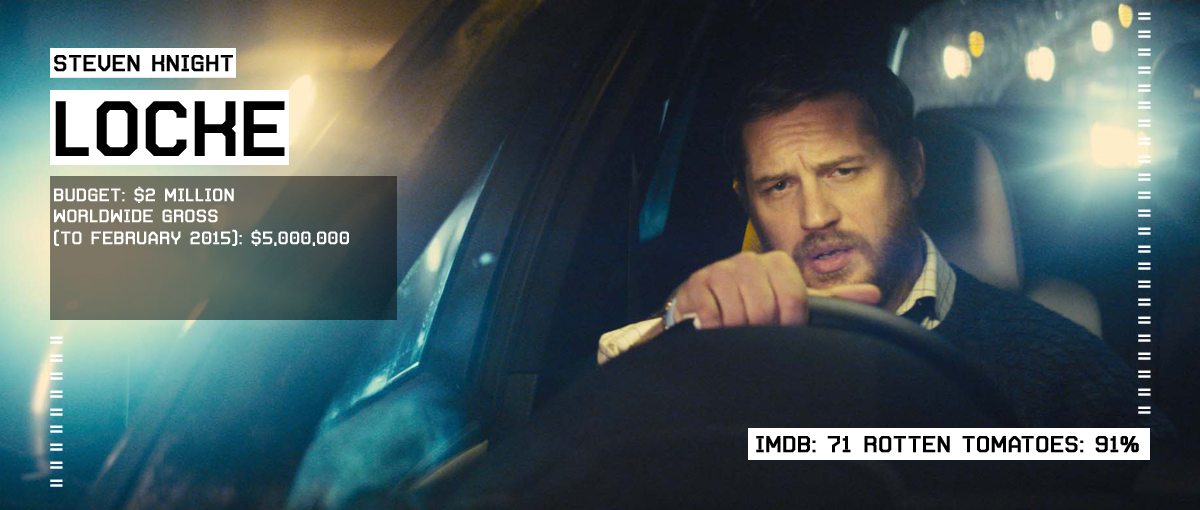
One man. One setting. Ivan Locke (Tom Hardy), is a very successful engineer who’s just hours away from delivering the biggest concrete pump made for a civil project in all Europe. On his way home, he receives an unexpected call that turns his life upside down. Armed only with his mobile phone, we follow Locke in his car while he engages in a series of conversations where job and family are left behind in order to do what he considers the “right thing”. The movie follows the formula of Buried (2010) where the main character is left to deal with a life changing event from a confined setting with limited resources.
Inexperienced director but veteran screenwriter Steven Knight delivers a stylistically simple, yet emotionally powerful portrait of morals, shame and regret. In my opinion, Tom Hardy delivers the performance of his career. If anybody wants to prove the old Mies van der Rohe saying that less is more, this is the film to pull it out.
25. National Gallery
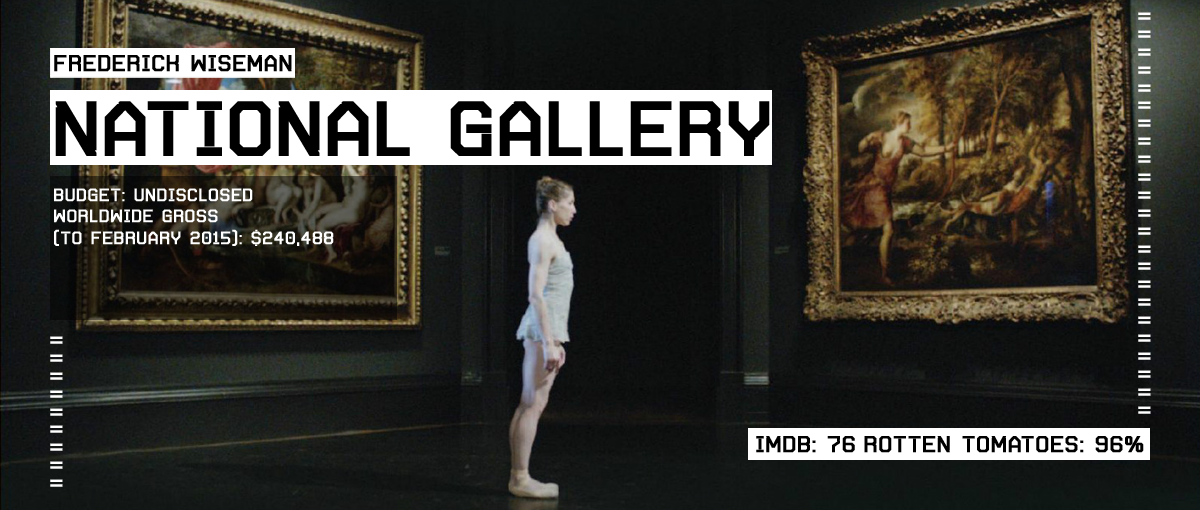
Veteran director Frederick Wiseman delivers such a rich audiovisual tour of London’s National Gallery that it almost turns out as a better experience than the real thing. In almost three hours he analyzes the behind the scenes of one of the world’s great Museums taking a peek at the gallery’s most seminal paintings and going over the policies and rituals involved in conserving and restoring such mainstays of human history. Wiseman takes the fly on the wall approach, being the most unobtrusive he can be, just letting the life inside the museum flourish in front of his patient lens.
The documentary also goes outside the Museum in order to contrast the inner workings of the Gallery with the people who visit it. The human response to the works is as crucial as the works themselves, and Wiseman skillfully provides us with a mosaic of visitors reactions that range from curiosity to horror. The film is not a didactic piece like something we can find in the Discovery Channel. This goes beyond informative and turns into a work of art in itself, being a contemplative reflection of the role of art in society and the reasons why we humans dedicate our lives to create it, conserve it and enjoy it.
24. Vi är bäst! (We are the Best!)
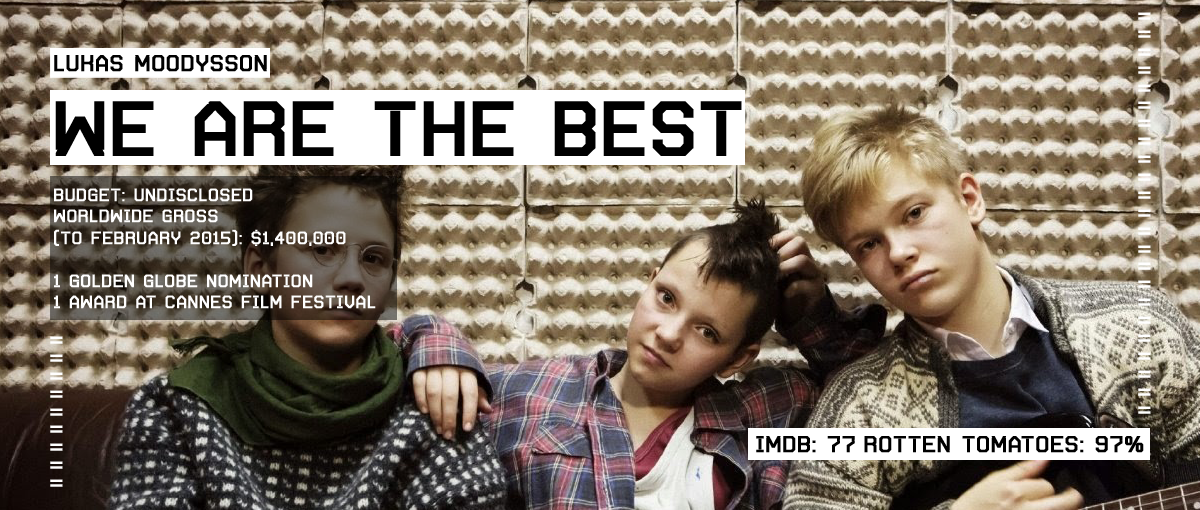
Critically acclaimed director Lukas Moodysson brings us the story of Bobo, Klara and Hedvig, (played brilliantly by Mira Barkhammar, Mira Grosin and Liv LeMoyne) three 13 year old girls segregated by the rest of their schoolmates basically for being different. These three loners take refuge in punk rock as the perfect medium to express themselves and seek for an identity. If having your first period and dealing with your parents isn’t hard enough, imagine going through adolescence while being part of a band and wearing a mohawk.
We are the Best is probably is the most charming and delightful movie of this list. It’s impossible not to smile at the delicious ingenuity of two mini socialist punks and a christian virtuoso guitarist forming the most unusual of bands. The contrast between the coarseness and political radicalism of punk against the playfulness of a children’s mind works brilliantly in so many levels, it’s a true joy to watch. What better idea than to depict punk as the refuge for the sense of alienation and insecurities of a pre-teen? Stylistically speaking, Moodysson also assumes a crude approach to the material, using handheld camera and natural light that gives the movie the appropriate urge and vitality the DIY movement is all about.
Adapted from the comic Never Goodnight by Coco Moodysson, this film is a snapshot both of childhood and also of the mood of the world in the 1980’s. Echoing The Sex Pistols legendary first gig, how could this film end if not in a riot?
23. A Girl Walks Home Alone at Night

By far the most original film of the year. A Girl Walks Home Alone at Night is the feature debut of Iranian-English director Ana Lily Amirpour. Self tagged as “the first Iranian vampire Western,” it delivers just what it promises. Gorgeous Iranian actress Sheila Vand stars as “the Girl”, a skateboard riding, hijab-wearing vampire who preys on the residents of an imaginary, gothic wasteland called “Bad City”. Much to her dismay, she encounters in her thirst quenching path a sensible human called Arash (Arash Marandi) for which she slowly falls in love. Complications ensue.
A Girl Walks Home Alone at Night is a moody and atmospheric film that borrows romance from the vampire classic Near Dark and adds to it the eerie mood of a David Lynch flick with a dash of Jim Jarmush. Just to get something like this financed is a feat in itself. If it were up to me, I’ll give Amirpour an Oscar, a Razzie and a million dollars for her next film.
22. Predestination
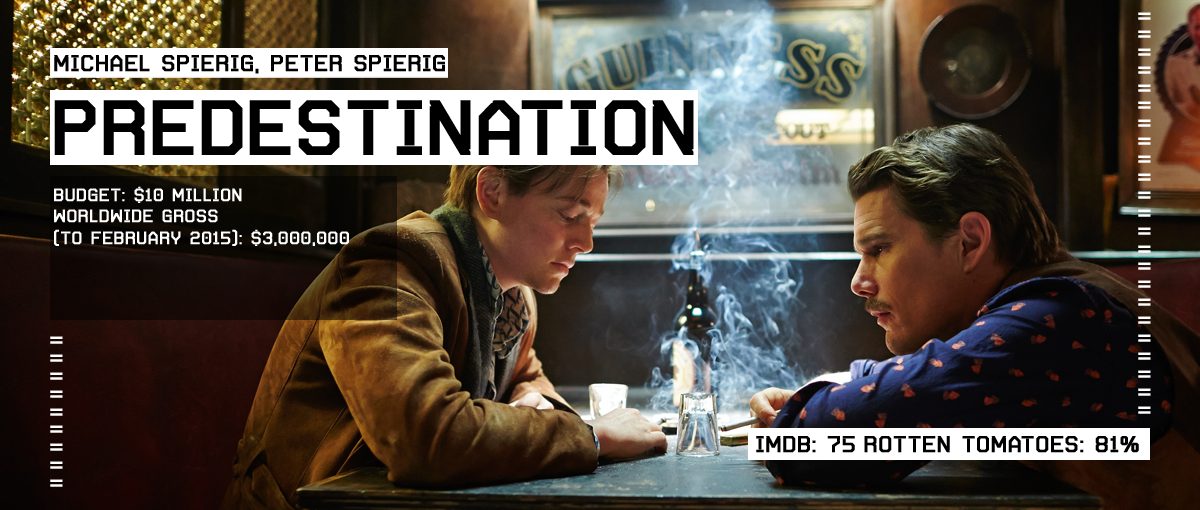
Do you like mind-fuck movies? Ethan Hawke is a time travel agent who has taken it as a personal challenge to capture an elusive psychopath nicknamed by the press as “The fizzle bomber”. The dangerous criminal has carried out a series of terrorist attacks in main cities throughout the United States, and ultimately sets off a bomb in 1975 New York that kills 11000 people. Ethan Hawke travels back and forth through time, picking up clues in order to reveal the identity of the terrorist, but his actions inevitably leave a trail that directly affects the events he is trying to prevent.
The Spierig brothers are what any young filmmaker wants to be when they grow up. They write, direct and even create the special effects of their films all by themselves. And in Predestination, brother Peter Spierig also writes the score (which, I may add is haunting and highly effective). The film is unnecessarily complicated at times, and incredibly simple at others (if you pay very close attention, you will discover the ending halfway through) but despite its minor flaws, this is one of the most intelligent pieces of cinema of the year. A film that does what most art should, leave your heart and brain throbbing.
From the visuals of the first 5 minutes you know this is something special. Ethan Hawke delivers a fantastic performance, but it’s Sarah Snook who steals the show and alerts the industry of her incredible talent. This film is a brainy, entertaining and classy sci-fi tale that borrows elements from 1940’s film noir and 1970’s crime flicks. Yet another entry in this list financed by public entities, which kind of hints where you should look at first as a movie goer the next time you go to the multiplex. Based on the short story –All of you Zombies– by Robert A. Heinlein the renown author of Starship Troopers.
21. Dear White People

Justin Simien’s feature film debut is alongside Myroslav Slaboshpytsky (The Tribe) the most resounding of 2014. While Slaboshpytsky showcased skillful camera use and intriguing visuals, Justin Simien impressed not so much for his formal traits but for his superbly intelligent screenplay. Dear White People proposes a witty, honest discussion of race in America that is both relevant and incredibly funny.
The film is set at fictitious Winchester University, a prestigious ivy league campus. Sam White (Tessa Thompson) is a gorgeous fast talking media major with a fervent activist stance. She hosts a radio show from which she drops poisonous bombs of sarcasm against the white alumnae. Sam is determined to prove that America is still very far from a post-racial era, and finds in the elections of the all-black Armstrong Parker house the perfect outlet to express her incendiary opinions. To complicate things further, her ex is the other candidate.
Sam ultimately wins the elections, but her real antagonist is Kurt (Kyle Gallner), the editor of the satirical college magazine “Pastiche”, who harangues reverse racism and portrays himself as a victim. The film arrives at a crucial point when editors of “Pastiche” organize a sardonic bash where students are invited to liberate their “inner Negro”. Black students crash the party and it quickly turns into an epic riot that serves as a fantastic reference to Spike Lee’s Do the Right Thing.
Every character in the film is contradictory, as Simien’s well crafted script purposely maneuvers into ambiguous territory. The film delivers blows at everybody and critiques the futility of taking radical sides in a conflict of such complexity. What Dear White People does best is attempting to open a real debate over prejudice while portraying an honest look at the reality of being black in a “white man’s world”.
20. La Isla Mínima (Marshland)
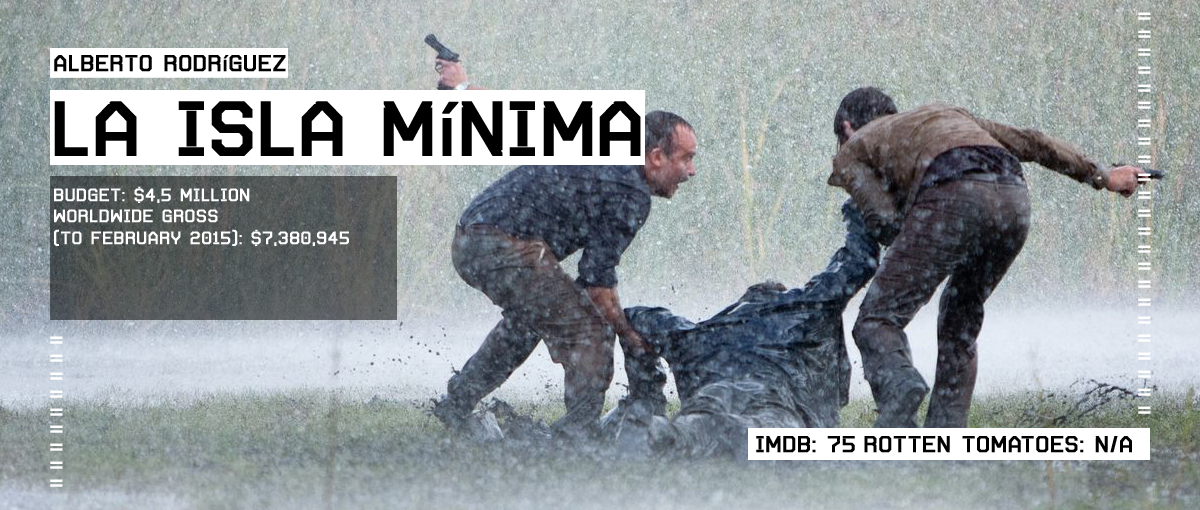
If you’re into classic cop thrillers, then this will blow you away. Set in the 1980’s during Spain’s transition to democracy, Juan and Pedro are two problematic detectives with completely opposite ideological views. Despite not going well together at all, they are sent to the deep south of Spain to a god forsaken town to investigate a series of brutal murders of adolescent girls occurred during the local festivities. They will soon find out the murders are the work of a heartless psychopathic that has been terrorizing the area for years.
The screenplay has lots of hints of social commentary here and there, but restrains what could have been a political film in favor of crafting a highly suspenseful detective story that evokes classic crime films of the 1940’and 50’s like Private Hell 36 and also takes influence from more recent neo noir like Seven or the HBO series True Detective.
In Marshlands, tension seems to be the basic principle that holds the story together. Every character has a hidden agenda, everyone has a past to hide in an ideologically fragile society. This film was ignored (outrageously in my opinion) by the Spanish academy to be included as the country’s entry for the foreign Oscar in favor for the much weaker Living is easy with eyes closed.
19. Whiplash

Andrew Neiman (Miles Teller) is a student of New York’s prestigious (fictional) Shaffer Conservatory music school. He has become a prodigal drummer through hard work and dedication, and wants to become an all time great like his idols Charlie Parker and Buddy Rich. One day he’s given the opportunity to make part of Shaffer’s studio jazz band, renown for being one of the best in the country and lead by Terrence Fletcher (J.K. Simmons), a ruthless conductor with unorthodox methods.
Whiplash and Boyhood are similar as both films are examples of how to take a worn out formula and make it look fresh by giving it a unique perspective. At the core, this is nothing but a sports film. You know, competition movies with the structure hero trains – fails – trains harder – and finally succeeds at an epic venue in the last second. But Damien Chazelle’s penned and directed tale goes beyond that. Since Ken Loach’s Ladybird Ladybird I haven’t seen an audience so emotionally immersed in a screening. People in the theater grunted in despair and sighed out loud following the ups and downs of this middle-class Jew attempting to achieve something bigger that what society has written for him.
Emotionally draining, and with the best sound design and editing of all the movies mentioned here, Whiplash is a reflection of the real price of achieving greatness in any field. The dynamic between Miles Teller and his mentor/nemesis J.K Simmons is riveting and worth the price of the ticket alone.
18. Feng ai (‘Til Madness Do Us Part)
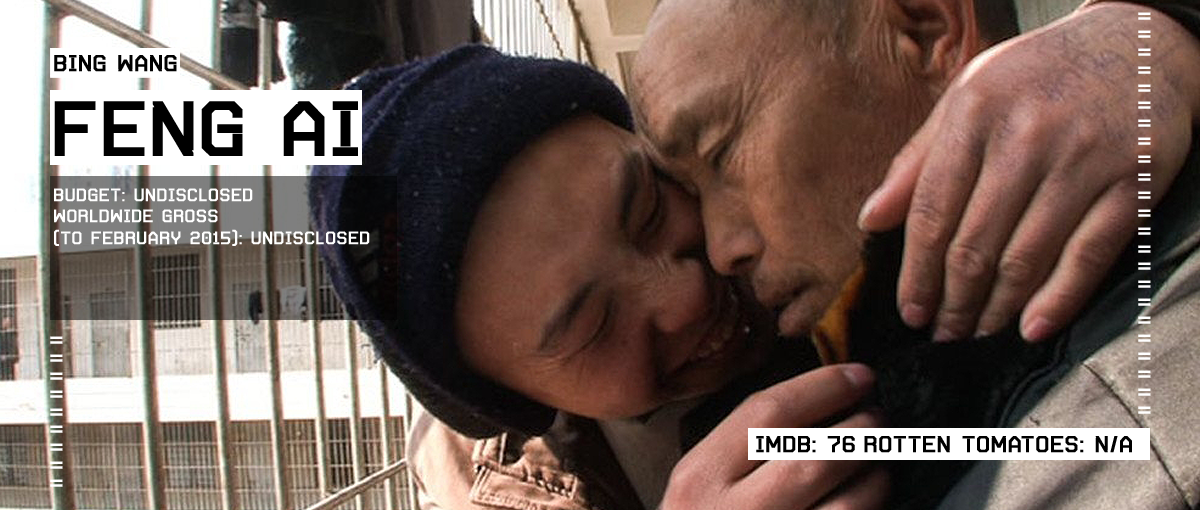
Wang Bing is one of China’s most respected and critically acclaimed documentary filmmakers. His films are not easy to stomach for mainstream audiences as they are overlong and deal with the very heart of human misery. But undoubtedly, his studies of the human condition are landmarks of contemporary film making. In ‘Til Madness Do us Part, Wang spent months inside a municipal penitentiary asylum capturing a real portrait of hell. Fascinatingly, he manages to find a certain surreal beauty in such a harsh setting.
Although the lives he depicts are immersed in the most dreadful conditions, Wang Bing’s camera renders these men with utmost respect and absolute dignity, avoiding to tell the audience what crimes they have committed and focusing instead on the personal universe they create in order to survive. Most of these inmates do not seem anymore like men, but rather like wandering ghosts in need of closure. Decades of poor sanitary conditions, overcrowded spaces and complete absence of privacy thicken them in the outside, but seem to mold them as extremely fragile and vulnerable beings beneath the surface. You will be moved, you’ll cry and you’ll be impressed to see how love fights to find a way despite the atrocious conditions.
17. Leviathan
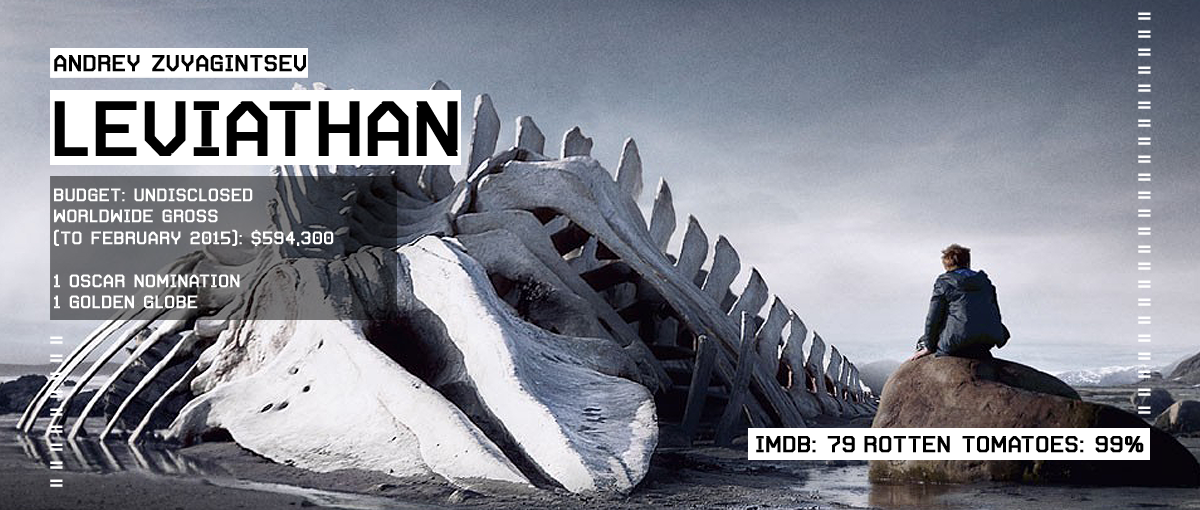
Kolya is a vodka drinking town simpleton who is suddenly faced against a giant conglomerate which is trying to aggressively buy his property for far less than its real value. The litigation process that will ensue will turn out to become the most transcendental confrontation of his life, and will put at risk much more than his hard earned possessions. Leviathan is a David vs Goliath film, that takes us on a ride across the morals of contemporary Russia. Beautiful, violent and shocking, it’s a film about the confrontation of the old world against the modern. Faith vs evolution, the rule of a war lord vs the rule of law.
This is maybe the darkest film I saw in 2014, and I’m sure that its thick plot and sober tone will not be everybody’s cup of tea. The film has already earned a Golden Globe and a best screenplay award at Cannes, so it won’t be a surprise if it took home the Oscar for best foreign language film. The convoluted plot of Leviathan is loosely based on the story of Marvin Heemeyer, a automotive repair shop owner who crushed a bulldozer into a town hall and killed himself in outrage over a zoning dispute in 2004.
With a fair amount of biblical references, writer/director Andrey Zvyagintsev manages to deliver a striking story about the clash between the monsters that we have inside, and those that surrounds us.
16. Tian zhu ding (A Touch of Sin)

To me this was the best Chinese film of the year. A Touch of Sin is a mosaic of four slightly interwoven stories that depict common people who end up committing gruesome crimes when presented face to face with a limit situation. Director Zhangke Jia purposely reflects on the state of Chinese contemporary society setting up the events throughout different social classes and geographies. We go from the mammoth southern cities of Guangzhou and Dongguan to the rural province of Shanxi.
The film features fluid camera work and excellent sound design in long takes that get the most out of the concise dialogue and beautiful Chinese landscapes. The film’s almost lyrical style is very effective in picturing the angst of living amidst the highly industrial and hyper connected society of today. Is there a latent evil inside all of us? Is corruption a result of post-modernity or is it just innate? Watching A Touch of Sin made me realize that aside from Asians having better fighting skills than us, (of course I’m joking. Nobody beats Chuck Norris ) we’re not so different after all.
15. Coherence

A small group of friends reunite for dinner coincidentally on a night where a comet is passing very close to the Earth. Aside from arising tensions among the group, they will soon have to deal with a physical anomaly caused by the comet that distorts space and time, making this soiree an occasion surely to remember.
I want to avoid revealing anymore of the plot in fear of ruining the experience for the readers that haven’t seen this yet. Because everything in Coherence is about the element of surprise, about the thrill and fear of not knowing what will happen next. The tight screenplay written by James Ward Byrkit is one of the most genuinely unpredictable that I have seen lately. It deals with an extremely weird situation but wisely grounds it in reality through highly emotional and realistic characters. One of the things that impressed me the most was reading that director James Ward Byrkit did not shoot this with a full script, but instead gave every day a card to each actor with action cues and motivations, and every actor didn’t know what the others got. This really shows in the final cut, as performances feel completely natural and the dynamics between the cast fluctuate in the most organic of manners.
This is a film that should be shown in every film school as a perfect motivator for students to get their asses off their seats to go shoot stuff. This is Byrkit’s first feature film, done with a laughable budget of 50k. Tight framing, only one location and excellent actors are all he needed to deliver one of the most exciting films of the year.
14. Nightcrawler

Louis Bloom (Jake Gyllenhaal) is an unemployed loner that makes a living out of hustling and performing petty thefts. By chance, one good day he discovers that taking footage of violent crime scenes and selling it to news stations is an interesting way of making money. Soon enough he will find that he has an innate talent for this new entrepreneurship, but his eagerness will take him as far as becoming the main player of one of the crimes he shoots.
Aside from being almost the perfect crime film, Nightcrawler can be taken as a comment on the culture of immediatism and greed in our contemporary society. Wealth and personal achievement are things media sell to us as quickly obtainable items that one can obtain bypassing hard work and patience. We want everything and we want it now. Louis Bloom is a child of the Google era, reciting his knowledge by memory with little thought or reflection, almost as if the information he finds on the net was something close to sacred writing. Jake Gyllenhaal’s portrayal of this creepy sociopath is so good, it reminded me of De Niro’s performance in Taxi Driver.
Director Dan Gilroy is one of the increasing number of seasoned screenwriters that have decided to take the director’s chair in order to gain greater control over their stories. This “trend” currently seems as the only way to salvage their work from being butchered by studios and producers.
13. Blue Ruin
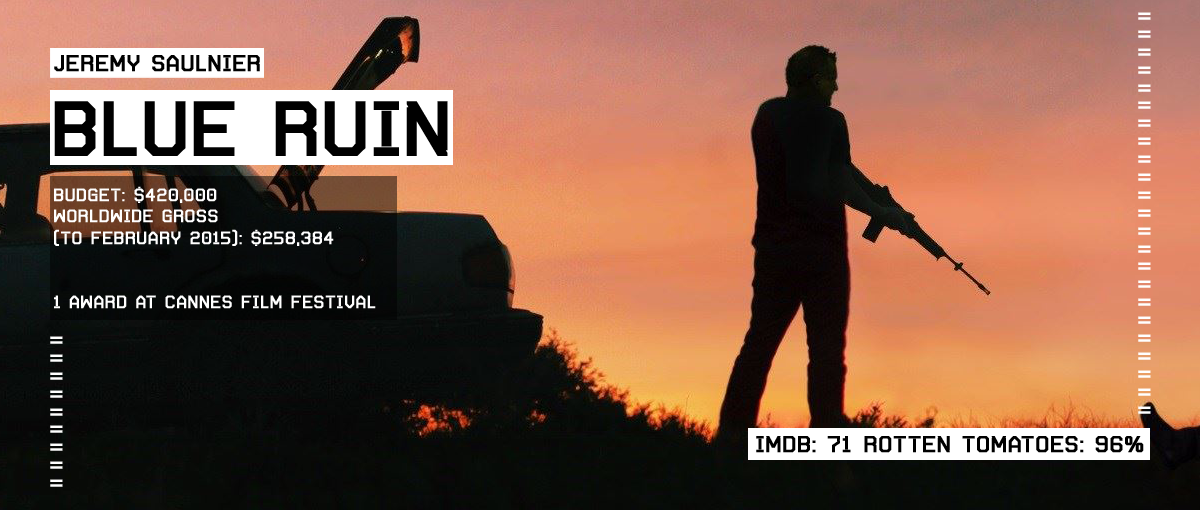
Dwight Evans (Macon Blair) is a peaceful, lonely beach bum busy dealing with survival. One good day, he’s given a piece of news that will change his quiet life forever. From that moment on he embarks on a violent quest of murder, vengeance and redemption that works on so many levels, it will equally satisfy an avid action fan and an art house fanatic. I won’t uncover any more details of the plot in fear of spoiling the movie for you. Precisely because the merit of this film resides on how writer/director/cinematographer Jeremy Saulnier conceals or reveals information in order to force viewers to fill in the gaps for themselves. Blue Ruin has no condescension for it’s audience, and requires an active stand to figure out where the story is heading. Nothing in this is predictable. No heroes. No bad guys either. Every character in Blue Ruin is flawed, criminal and even clumsy. They’re all amateurs of evil.
12. Corn island

The Inguri River in Georgia annually drops its level to reveal small fertile islands that prove to be ideal for corn crops. These islands are unclaimed land as they’re located in a natural border that separates Georgia from the disputed territories of Abkhazia. Every year, people from all over the country come to these islands to inhabit them during the low tide season, with the intention of harvesting sufficient corn to survive the winter. An old man and a young teen settle in one of these floating lands to order to farm it. Their somewhat peaceful stay will soon be rattled as a wounded Georgian soldier arrives at their doorstep. This event will force them to take stance amidst the political conflict.
The film proves to be the most unusual of thrillers, as the old man has to fend off hunters, separatists and the growing tide of the river amidst his growing distrust towards the soldier. Director George Ovashvili creates a meditative, yet incredibly tense struggle where a vulnerable couple is set against the most terrible of both natural and human foes.
The greatest feat of this film is to create a ticking clock thriller with the minimum of elements. We only see two actors for most of the screen time and the film has very little dialogue. Director Ovashvili compensates with an immersing sound design and beautiful crafted shots of the misty, phantasmagorical landscape. Epic in scope, yet minimal in execution, it’s ironic how Corn Island is able to achieve such a satisfying and gripping experience with so little while many of the million dollar blockbusters of the year only produced loud yawns.
11. Guardians of the Galaxy

Based on one of Marvel Comics lesser known properties, Guardians tells the story of a group of criminals who unite forces in order to prevent an intergalactic racist from destroying the universe. (No, really) This unlikely alliance is led by Peter Quill, a human (not really) who’s abducted as a child by extraterrestrial beings soon after the death of his mother.
The original comic is not that great and the synopsis really looks like a joke. Disney/Marvel took a huge risk when it green lit the project giving it to James Gunn of all people, a director with no prior box office success and preceded by huge internet backlash from feminist groups for his blog post “The 50 superheroes you most want to have sex with”. I bet nobody in the industry could predict the movie would become the third highest grossing movie in the entire Marvel catalog earning $774 million dollars worldwide.
In the last decade or so, the movie business has been over saturated by the superhero craze. And quite frankly it’s becoming a boring trend used to exhaustion. What makes Guardians of the Galaxy different from the pack is that it feels as if it was written by an actual human being and not by some algorithm interpreting Twitter trends. James Gunn created a fresh take on the superhero sub-genre, penning a set of characters that are not depicted as mutant super warriors with an agenda, but as flawed, powerless misfits given with an opportunity for redemption. Heart, and not special effects are the core of this film.
Its rich characters, incredible world building and nostalgic music from the 70’s make of Guardians of the Galaxy the closest I’ve ever got to that long gone feeling of being a little kid and experiencing Star Wars for the first time. And that’s saying a lot.
10. Maps to the Stars

We follow the lives of two Hollywood actors and a personal assistant as they battle against personal demons of the past. While their story unfolds we will find out that their disconnected paths are actually part of a same narrative full of depraved and sordid events. Maps to the Stars is a surreal, creepy satire on Hollywood and the celebrity culture that feels so uncomfortable the only escape is to laugh.
Steamy sex, yet somehow disgusting. Psychological torture. Gory murders. Yeah, this is a David Cronenberg film alright. And as such it has divided opinion from its very first screening at the Cannes film festival. Critics and audiences that went into the theater expecting his body horror gore fests of the 80’s have mercilessly trashed not only Maps to the Stars but the rest of his recent filmography. What the neo-Cronenberg haters haven’t realized yet is that his films actually revolve around the same ideas of his body horror era, only he is now a much more polished director who has kicked his film making up a few notches in the torturing-of-the-mind department, while toning down the scientific aspects of his prior work. The same principles that made him one of the most distinctive artists of the world are still present, brighter than ever.
Just as he has did in The Fly or Scanners, here we have a bunch of characters that are unable to control their own destinies, despite all their power. Cynical, vulnerable people that can’t take a wipe at their ass without asking for help. In this film he introduces an element that I haven’t felt in his prior movies, an atmospheric, eerie vibe more akin to David Lynch. Maps to the Stars is a Matrioska of dread and filth. Characters and situations constantly replicate themselves over and over making this is a disturbing tale that will leave no one indifferent. If you divide opinion, there’s something you’re doing right.
9. Winter Sleep

This dark Turkish drama has some of the most thoughtful and well written lines of dialog I’ve ever heard in a film. Adapted from Chekhov’s classic short story “The Wife” Winter Sleep follows the day to day of Aydin (Haluk Bilinger), a retired actor who is the wealthiest landlord of a very impoverished region in Cappadocia. He’s well educated, has married a beautiful young wife and is considered the most successful citizen of the town. This empowers him with a sense of condescendence towards everyone who surrounds him, which in turn makes every single character in the film despise his presence. (Even children throw stones at his car) Aydin keeps sticking his nose in the lives of everyone he knows, well intentioned, and most of the time doing the “right thing”. Yet we feel that everything he does is just watered down charity that does more wrong than good.
Winter Sleep clearly blurs the lines of moral prejudices and tries to depict the notion of good and bad as the most relative of concepts. You don’t have to use a cape and blow fire out of your ass to be a super hero, the same way you don’t need horns and a tail to be a villain. Every day is a morality test, and each conversation we have is an opportunity to save or hurt someone beyond repair. Although the most notable aspect of the film is its rich dialogue, director Nuri Bilge Ceylan also displays an interesting mise en scene using restrained camera work and multi-layered compositions. Note to Hollywood: You don’t have to shake the camera to make it feel “real”.
Surprisingly, Winter Sleep unfairly received a cold shoulder from Oscars despite taking home the Palm d’Or at Cannes. Why is it unfair? Just check out the 20 minute exchange between Aydin and his sister (played by Demet Akbag). That scene alone is more powerful than most of the films nominated for best picture.
8. Force Majeure

This Swedish film by Ruben Ostlund is another ignored gem by the Academy at this year’s Oscars. Thomas (Johannes Kuhnke) is a businessman vacationing with his family at a luxury winter ski resort in the French Alps. Kids are having fun, and the retreat seems to be soothing for his wife Ebba (Lisa Loven Kongsli). They are having such a good time, none of them could suspect that an inoffensive snow avalanche near the resort’s premises will change their family dynamics forever. After this chance event, trust will be damaged beyond repair.
Force Majeure is the most pleasantly uncomfortable film I’ve saw last year. It functions both as a black comedy and a dark drama. It’ll make you laugh, it will make you cringe and it will make you reflect about how one would react in a life threatening situation. It’s incredible how a single split-second decision can change our life forever and define the kind of person we are. Is it fair to define a man over just one instant? (Just for kicks, check out Director Ruben Ostlund’s reaction at being snubbed by the Academy)
7. Starred Up

No prison movie cliché here. Nobody is trying to escape and no one is going for the soap trick in the showers either. Eric Love (Jack O’Connell) is a 19 year old British criminal too violent for juvenile hall. He’s sent to an adult prison where he inevitably has to embrace his darkest instincts in order to survive in such an extreme environment. But there is a circumstance that will make his penitentiary life much harder. His dad (which he hasn’t seen since age 5) is also an inmate in the same cell block. If you think you have a difficult father-son relationship, imagine the dynamic unfolding in jail. The title of the movie is a reference to how inmates call young offenders that are been transferred “early” to an adult prison.
This is a heart draining prison drama that deals with controversial subjects, so you can guess this is financed with public funds and no studio backing. Starred Up is one if not the most realistic prison film I’ve ever seen. (I worked for a year shooting a documentary at a penitentiary, so I know what I’m talking about here) Just like in the real world, these guys are not tattooed caricatures. They are just human beings that made a mistake.
Director David Mackenzie puts form in full service of the material, avoiding the use of a background musical score, lighting with practicals and elegantly using hand held camera in very tight spaces to convey a sense of claustrophobia and alienation. Every single actor gives outstanding performances, but this is Jack O’Connell’s show. He makes an incredible display of both physicality and emotion. There is little doubt he’s going to be one of most renown male performers in the next 5 years, so keep an eye on the guy.
The film is so uncomfortable and shocking, it made me feel as an ungrateful bastard for taking such simple things like a warm bath for granted. I don’t know for sure if it was Mackenzie’s intention, but the movie serves as a critical examination at the penitentiary system and makes one think twice about the benefit of locking up a criminal with more criminals. How do you expect that’s going to end?
6. Boyhood
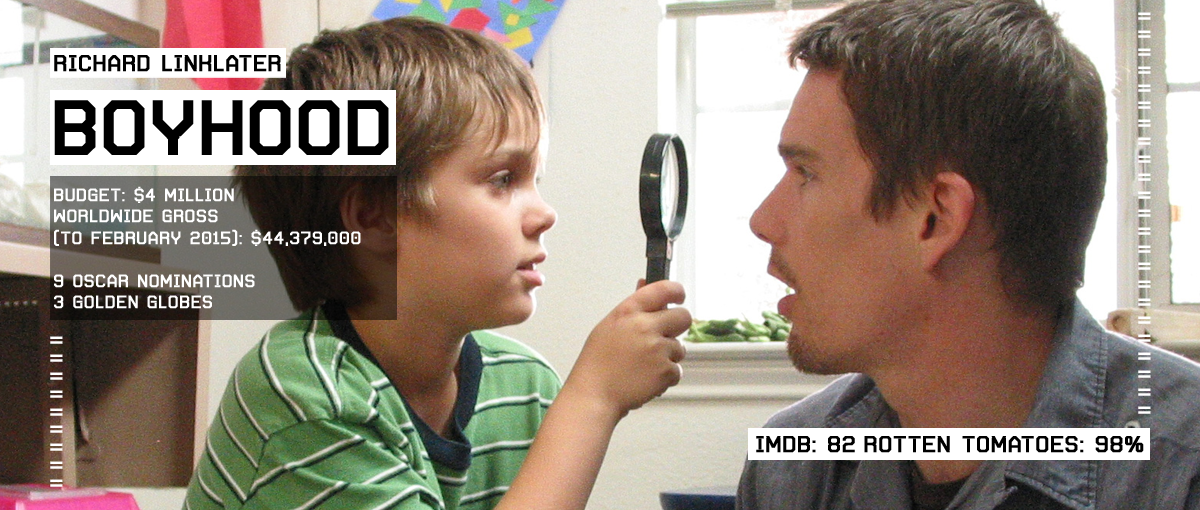
If there is such a thing as a MOM (Mother of all Movies) this is the closest it gets. From the sheer heroism that means to edit such a mammoth, to the almost inhuman persistence required to sustain a project for so many years, production wise, Boyhood is unquestionably one of greatest achievements in movie making history.
The film is the coming-of-age tale of Mason (Ellar Coltrane) as we follow his relationship with the world that surrounds him from age 6 to 18. The constant financial and emotional struggles of his divorced parents (Patricia Arquette, Ethan Hawke), his first love, and even his college application process are captured throughout 12 years of production with the same cast.
From the moment of its release the film has received unanimous acclaim among critics and audiences, some calling it the best American movie of the decade, and others going so far as labeling it as a life changing experience. Quite frankly so much praise feels suspicious to me. If I’ve learned one thing in life is that whatever poses as universally appealing is in reality quite bad. (Billboard top 40 for example? McDonalds? ) Incontinent, pseudo-intellectual critics on the other hand have screamed and shouted at the top of their lungs that Boyhood is a mundane work with nothing particularly original about it. Well, you know what? Both sides are absolutely right. There is nothing innovative about the plot. We’ve seen this time and again. Not even the shooting style is unique as there have been other films like Michael Apted’s documentary series Up, and even Linklater’s own Before trilogy which similarly, are shot over several years with a same cast.
Yet it’s Richard Linklater’s scope and unique execution what makes this well known material unexpectedly feel so powerful. He steers the events in such a delicate way we get the sensation of not only experiencing a movie, but a real slice of life. All these characters and not only the children, grow before our eyes to reveal an evolution that mimics reality like it has seldom captured on film. The life of a little boy turns out to be a snapshot of America’s history throughout the last decade. Time capsule, emotional joyride, fucking work of art. As renowned Director Mike Leigh put it, “It’s the definitive independent film”.
5. Grand Budapest Hotel
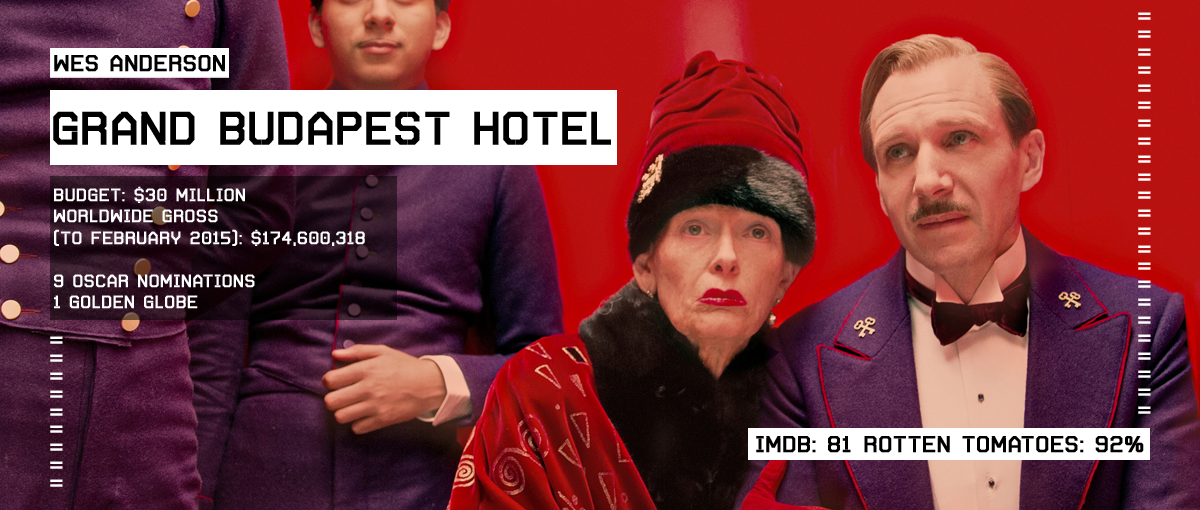
Wes Anderson has made the only tale of ultra violence and crime that I know of that will certainly put a smile on your face. Ralph Fiennes plays Monsieur Gustave H., the devoted concierge of the Grand Budapest Hotel. (which according to the film is not located in Hungary but in the fictitious country of Zubrowka) Monsieur Gustave’s finds himself embroiled in a convoluted assassination plot after one of his guests, Madame Céline Villeneuve Desgoffe und Taxis (played by Tilda Swinton) dies in mysterious circumstances. His faithful apprentice Zero, (played by Tony Revolori) and a series of colorful characters lead by the extraordinary Saoirse Ronan (Agatha) aid Gustave in his quest to clean his name and reclaim a priceless painting that has been bequeath to him. All of this delightful chaos amidst the rise and fall of Nazi Germany.
Sure sounds like a mess, and in all truth it is… but in a good way. The film is a well thought homage to the sophistication of Ernst Lubitsch films of the 1930’s, with its extensive use of smooth tracking shots, symmetrical compositions and glamorous settings. Adam Stockhausen’s production design and Alexandre Desplat’s musical score are the best works of 2014 in their respective fields and if the world was a better place, they should win the Oscar without question. Grand Budapest Hotel is the most stylized and elegantly crafted movie of the year.
4. Calvary

This film is the perfect example of how to grab the attention of an audience in the first scene. In fact, Calvary’s opening is one of the most gripping and powerful I’ve experienced in a long time. It successfully ignites the wick of a bomb that will not explode until the very end. Father James is one of the two priests of a small Irish town. Folks live a simple and quiet life and everybody knows everybody. One day during confession, a parishioner sentences James to death and promises to execute the threat in the following Sunday. The identity of the would-be assassin is hidden from the audience, but of course, Father James is aware of who this parishioner is. What will he do?
Calvary is similar to Leviathan as both film deal with the clash of values from the old and the modern world. It also weights over the importance of spirituality in a time ruled by technology and pragmatism. Can a man with integrity survive in the modern age? Is it worth it today to die in the pursuit of righteousness? Calvary is a painfully beautiful work of art written and directed by John Michael Mcdonagh and starred brilliantly by Brendan Gleeson, who gives an imposing and brutally honest portrayal of a man carrying a personal battlefield in his heart. In my opinion it should have got at least one Oscar nomination at the 87th Academy Awards.
3. Snowpiercer
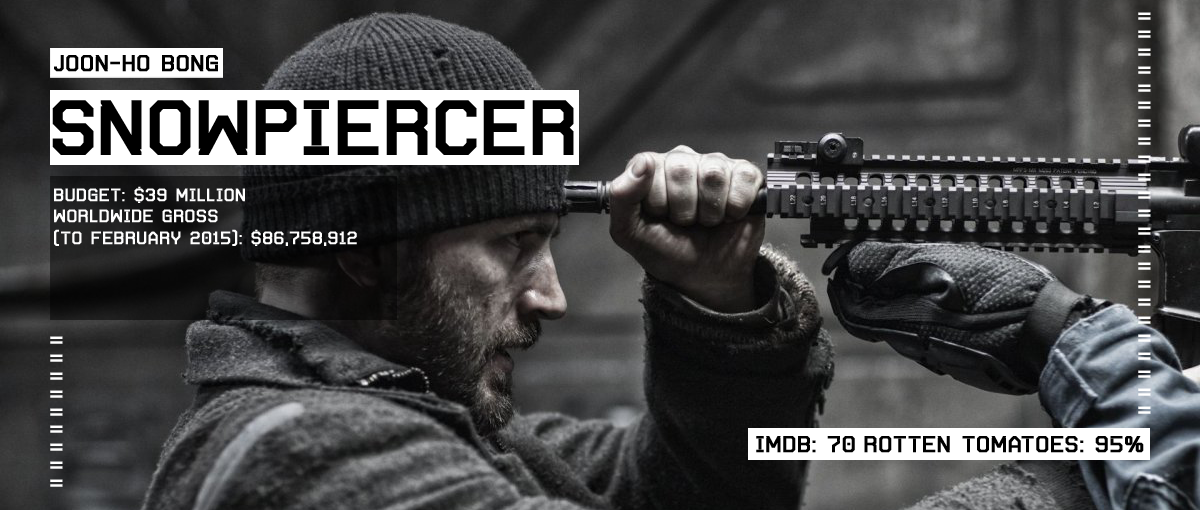
In the near future, governments of the world have united in order to battle the menace of climate change. They all agree to deploy in the atmosphere a certain chemical that promises to bring the temperature of the Earth back to sustainable levels. This solution turns out to be the worst mistake in history as it accidentally accelerates the effects taking the planet back into the ice age and wiping the entire human race. Only a few hundred people manage to escape the catastrophe by boarding a high speed train designed to circumvent the globe.
The film serves as an allegory to the division of society in social classes and the inherent tragedy of a vertical hierarchical system. The train itself is a reflection of the world in every level, with the poorest citizens devoid of light and water at the very back wagons, and the wealthy elite at the front, pulling the train ahead. Yet both sections lack from windows and both seem isolated from what’s happening around them, worried only about the satisfaction of essential needs. (food, water, entertainment, lust) Interestingly enough, the middle sections do have windows, with its occupants the only ones in the whole train able to see the exterior. (There’s your dose of food for thought of the year)
Hyper violent, action packed and with a couple of really emotional moments, Bong Joon-ho’s Snowpiercer enormous value resides on its ability to work as pure entertainment and at the same time serve as a crude commentary on our current model of society. Despite having the camera placed in such a confined space, director Bong managed to create striking and pulsating visuals full of symbolism perfectly exemplifying what cinema is all about: communicating ideas through images and sound.
Chris Evans, Tilda Swinton and Octavia Spencer deliver outstanding performances full of range. To me, this reworking of the French comic Le Transperceneige of 1982 is one of the best comic to film adaptations ever made.
2. The Tribe (Plemya)

This is the only film I’ve ever seen, and maybe the only one out there, made entirely in sign language with no subtitles. Yes, you read it well. No spoken dialogue in more than two hours. Director Myroslav Slaboshpytsky has taken the mere foundations of the art of cinema; image and sound, and has produced a brutally disturbing film that roars louder than the most scandalous of Michael Bay’s explosions.
The story is set in an Ukrainian boarding school for deaf teens. The boarding school is a torrid pit of corruption where children are pushed into prostitution and robbery. Shy new boy Serhiy (Hryhory Fesenko) is forced into this underground economy ruled by a improvised power structure known as “The tribe” where force and fear are the means of control. Serhiy’s relationship with his assigned pimp Yana (Yana Novikova) becomes his way of clinging on to his fading humanity, and the intimacy they share will make him fall in love with her. This relationship will put his life at risk for breaking the rules of the organization’s hierarchy.
The film is a ticking bomb full of tension and intensity that explodes in the final third leaving an emotional devastation that will not desert your head in days. Snubbed by its own country for the Oscar race in a decision splashed by corruption allegations, The Tribe was one of the festival darlings of the year and certainly one of the most outstanding directorial debuts of recent times. Most devastating film I saw in 2014.
1. Birdman

With the overdose of superhero films that is slowly draining the life out of big budget cinema, it’s more than ironic and self conscientious that the best film of the year is precisely about a caped (winged) crusader. Michael Keaton is a fading actor desperately looking for a comeback. He was world famous for playing a superhero named Birdman in the 90’s but from then on his career had not reached the same heights. Obsessed with earning respect as an artist and not just as a popular figure, he embarks on the enterprise of writing, directing and staring a Broadway adaptation of What we talk about when we talk about love, a short story by critically acclaimed writer of the 70’s and 80’s Raymond Carver. The venue chosen for such undertaking is non other that the legendary St. James theater.
This crusade will turn out to be a life defining experience, as all his values, money and reputation will be risked for something that not even him is entirely sure is worth it. Echoing Alfred Hitchcock classic The Rope, the film is composed by 16 shots stitched together giving the illusion of the whole movie being made in just one take.
Much has been said, good and bad about this film by Mexican Alejandro Gonzalez Iñarritu. Negative reviews have focused in labeling Birdman as pretentious and superficial, while other critics refer to its camera work as a technical gimmick that is more distracting than anything else. What do I have to say about that? Strap a f***ing Steadicam for 8 hours a day for a straight week and then come back and call it a gimmick motherf***ers! This movie is both formally and thematically one of the best productions to come out from the studio system in many years. It’s a frontal assault to both the superhero fad and the superficiality of culture and media in our times, serving also as a bold technical accomplishment.
Although there have been other examples of films done in “one shot” like Russian Ark or the more recent La Casa Muda, it’s Iñarritu’s vision the most polished example so far of long shot film making. The complexity of the choreography between the actors, the variations in rhythm inside the scenes and the fact that the camera conceptually coexists with the material will make Birdman a case study for directors, actors and cinematographers for years to come. Technological advancements as luminous lenses, highly sensitive sensors and incredibly light cameras weren’t available a few years ago, making this film a testament of the stylistic possibilities of the filmmakers of today.
But it’s not only the technical prowess what ranks this film as the best of the year. It’s the perfect assembly of form and subject matter what defines it as such a commendable work of art. The disconnected nature of it’s drum based jazz musical score contrasts with the fluidity of the camera work, making this drama feel both uninterrupted and chaotic, just as real life is.
The human need to be loved and not forgotten is laid out as the main premise and the recurrent theme throughout the film. In fact, the opening title card is in reality Raymond Carver’s epitaph:
“And did you get what you wanted from this life, even so? I did. And what did you want? To call myself beloved, to feel myself beloved on the earth.”
But how does that universal longing translate in a time where you only need to walk in your underwear down a crowded street to be “remembered”?

March 1, 2015
I just want to let you know how much I appreciate this list.
March 7, 2015
Hey thanks! Very pleased that you liked it.